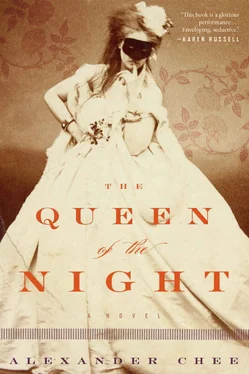This last, in some ways, was the most confusing for me, the part that would be the hardest to forgive.
§
It’s for the best they rejected you, Pauline said of the Conservatoire after she had heard me sing a little. Pauline then launched into a critique of their system. Too many teachers confuses, she said. The tenor tells me you studied with Delsarte, yes?
Yes, I said.
Delsarte will tell anyone he lost his voice to the Conservatoire’s methods, she said. It may even be true.
She let this stay in the air a moment before continuing.
There are two voices for an opera singer, Pauline said. Your speaking voice, which can be as ordinary as a wren’s. And then the singing voice, which can sound as strange as something the wren found and holds in its beak, as if it comes from some other place entirely. For most singers, that voice is something made from the first, carefully, with both passion and patience. A patience born of that passion. For a few, their voice is a gift and can improve with training, but it has qualities that cannot be taught. And because the singer did not make this voice herself with careful training, she does not know what those qualities are except that she finds them by singing.
She paused and then said, She also does not know when the gift will break.
She smiled at me as she said that. Be careful of your roles, she said. I sang everything out of youthful pride in my three-octave voice, and I should not have. Yours is much like my own. It will not last forever, this voice. I know this seems very cruel, as you must give everything to become a singer and then it may be taken from you all at once. The voice can go quite suddenly or slowly, but even with a slow departure, once it is underway, it will sound as if the original voice has already left you.
I said nothing, alternately warm from her compliment — she believed my voice was like hers! — and chilled entirely by this warning, which was, of course, meant to chill me.
She then began to play a slow scale and then went faster, the movement between high C to high E flat and back down again.
There, she said. Did you hear it? That’s one place you may fall.
She played it again, the notes sounding this time almost like a trap.
Don’t be afraid, she said. It’s not just the melodies we should know. We must know also where we could fail. Learn them and you will never fall, not, at least, before your time.
§
After my lesson was done, I passed by Pauline’s library, where her autographed manuscript score of Mozart’s Don Giovanni stood on a music stand. I went in, as was now my custom. The Mozart manuscript lay open, turned to a new page every day, as if each day Pauline came in and looked over the handiwork of her hero now that she was also a composer.
Le Dernier Sorcier had been a success in Weimar and Karlsruhe, and this had filled her with some new courage and happiness. She was now busy with her commission from the Queen of Prussia. Turgenev also had brightened in the reflected glory, though he sometimes seemed still pained by the regrettable controversy he made when he published praise of the production, for which he was intensely criticized — he was, after all, the author of the libretto, beyond all other personal relations to the opera, the singers, and the production. The scandal had wounded him and Pauline both; in the Haustheater we understood it as an excess of enthusiasm, the madness of love, and forgave it. But out in the world, it was egotism, nepotism, and, given the way they lived here, a disgrace.
This scandal would subside, but after I left there, in the years that followed, I would often have a chance to reflect on the doubled irony, the twin fictions of Pauline as “ugly” and the temptress who brutally controlled Turgenev. Whenever it came up in conversations, I would recoil and sometimes want to assure them as Natalya assured me, that Turgenev was the one who’d urged Pauline to take her composing more seriously as her voice began to fade — he did what he did out of his faith in her talents as a composer, as well as out of love. We all knew Pauline’s mother had forced her to sing — Pauline had wanted to stay at her piano, out of sight. I thought of this often when we sat down to our lessons there — how, as her singing voice left her, this voice, the piano, remained — the one she’d preferred all along.
When I saw them working together, their heads bent over the score, making adjustments and speaking intensely over this or that part of the new drama, I saw a kind of love I’d not seen before, a devotion unlike any other. To the extent he’d disgraced her and himself, it was born of an excess of his fear that the world — that world that had judged her voice by her face — would not accept this from her, either. And yet I also understood that he should never have published that essay. There were too many of his readers who believed our strange little paradise, these two houses side by side, were a disgrace.
My own devotion brought me to Pauline’s Mozart shrine, though I did not come for Mozart. A portrait of Pauline’s sister, Maria, looked down from over the mantel in that room. I went in and stood before it.
This was my talisman. I had memorized her long white neck, her large dark eyes as familiar to me as those of anyone else’s in the house. The lesson Pauline wanted us, her students, to take from her stories of her sister was that she had died too young, a victim of her own reckless ambition. But I, increasingly certain I lacked Pauline’s genius, had become enchanted with the portrait and had, more and more, taken another lesson. While Pauline was not the same kind of beauty as she and had suffered for it, at least Maria would not know the ignominy of being a voiceless singer with no other talents.
I understood Maria’s recklessness differently. Nothing waited for her if she could not sing, much as I suspected nothing would wait for me. But I still believed that fame could save me, somehow, even from this, and I would for some time.
This movement — between my room, her music room, this library, this is how I spent my time in Baden-Baden until the war began.
IN THE SUMMER OF 1870, when French society declined their usual visits to the spas and casinos in Baden-Baden, it was clear to Europe there would finally be war between Prussia and France.
For nearly a year Pauline had hoped to at least have her good friend, George Sand, come to see Le Dernier Sorcier performed and then, when that failed, had begun to plan a trip to her — we would perform for her there, in Nohant in her theater instead. We were to go in July, around the time of their birthdays, and the performance would be in her honor.
It was a great compliment to be asked, and as the tenor had been gone for a month at least, with no sign of returning, I said yes, excited at the thought of a trip without him.
The news of the possibility of war cheered me at first, as the talk in Germany was of how quickly it would be over; the French, we were assured again and again, could not hope to prevail. Surely it would be the end of the regime, Pauline said one night, when this sentiment was expressed at her dinner table.
The end of the regime meant, to me at least, if not my outright freedom, the beginning of it. Inside France, the idea of a France without the Emperor and Empress had seemed impossible for me to imagine. But from inside Germany, it seemed certain. When this was done, I would be able to leave the tenor then, I was sure. This trip could be the first of many without him, I hoped.
We must go to her sooner than July, it would seem, Pauline then said to the table and us, her assembled troupe. She did not need to say Sand’s name.
Читать дальше












